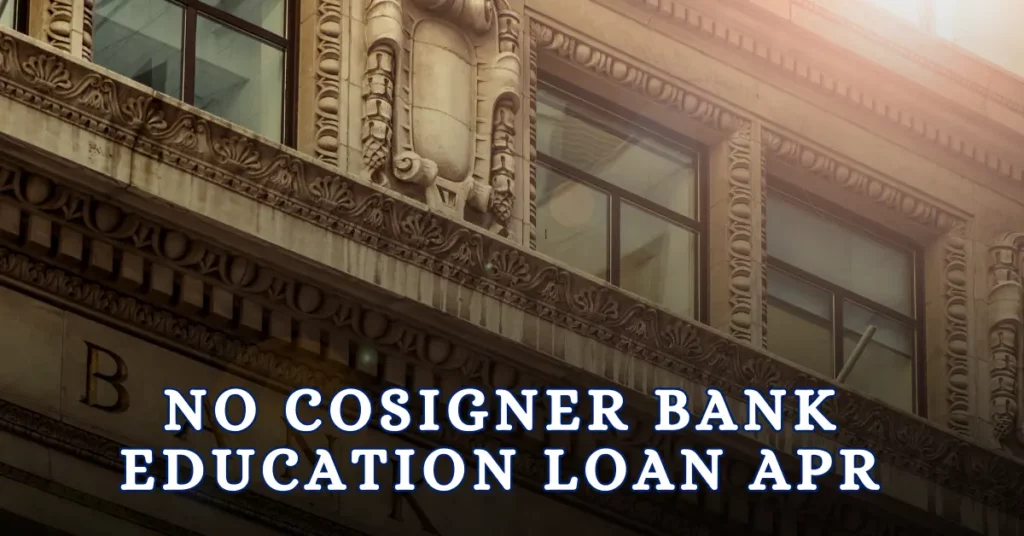
Table of Contents:
- Understanding No-Cosigner Bank Education Loans
- The Importance of APR in Education Loans
- Benefits of No-Cosigner Bank Education Loans
- Eligibility Criteria for No-Cosigner Bank Education Loans
- How to Apply for a No-Cosigner Bank Education Loan
- Factors Affecting APR in No-Cosigner Education Loans
- Managing Repayment of No-Cosigner Bank Education Loans
- Conclusion
- Frequently Asked Questions
Many dream of furthering their education, and the financial challenges deter them. Typically, students depend on loans, which require someone else to sign them before they get the money needed. Conversely, nowadays, many students opt for bank educational loans without asking for cosigners.
In this detailed guide, we will examine everything related to bank educational loans with no cosigner requirement, including the Annual Percentage Rates (APR) and other crucial aspects, to help you make an informed decision.
Understanding No-Cosigner Bank Education Loans
No-cosigner bank education loans are financial products designed specifically for students who may not have a qualified cosigner. These loans are an excellent option for students who wish to maintain financial independence or those who do not have someone to cosign for them. Unlike traditional student loans, these loans rely on the student’s creditworthiness and potential future earnings.
The Importance of APR in Education Loans
Annual Percentage Rate (APR) is an important consideration in applying for loans, including student loans. It represents the cost of borrowing money over a year expressed as a percentage of the loan amount. The APR also includes the interest rate plus any other charges or fees. Student loan applicants find it useful to understand APR because they can discern various loan alternatives and select the one with more favorable conditions.
Benefits of No-Cosigner Bank Education Loans
There are several benefits to choosing no-cosigner bank education loans:
Independence: Students can secure funding without relying on a cosigner, maintaining their financial independence.
Flexibility: These loans often offer flexible repayment terms tailored to the student’s future earning potential.
Building Credit: Repaying a no-cosigner loan responsibly can help students build their credit history and improve their credit scores.
Eligibility Criteria for No-Cosigner Bank Education Loans
To qualify for a no-cosigner bank education loan, students generally need to meet specific eligibility criteria, such as:
- A minimum credit score
- Proof of enrollment in an accredited institution
- Demonstrated ability to repay the loan based on future earning potential
How to Apply for a No-Cosigner Bank Education Loan
The application process for a no-cosigner bank education loan involves several steps:
1. Research
Start by researching different lenders and comparing their loan offerings.
2. Gather Documents
Prepare necessary documents, including proof of enrollment, identification, and financial information.
3. Submit Application
Fill out the loan application form accurately and submit it along with the required documents.
4. Await Approval
The lender will review your application and determine your eligibility based on their criteria.
Factors Affecting APR in No-Cosigner Education Loans
Several factors can influence the APR on a no-cosigner bank education loan, including:
Credit Score: A higher credit score can lead to a lower APR as it indicates lower risk to the lender.
Loan Amount:Larger loan amounts may come with higher APRs due to increased risk.
Repayment Term: Longer repayment terms might result in higher APRs as the lender assumes more risk over a longer period.
Comparing No-Cosigner Education Loan Options
When comparing no-cosigner bank education loans, consider the following:
- APR and Interest Rates: Compare the APRs and interest rates offered by different lenders.
- Repayment Terms: Look for flexible repayment options that fit your financial situation.
- Additional Fees: Be aware of any additional fees, such as origination fees or late payment penalties.
Managing Repayment of No-Cosigner Bank Education Loans
Effective management of loan repayment is crucial to avoid financial strain. Consider these tips:
- Create a Budget: Develop a budget to manage your finances and ensure timely loan payments.
- Explore Repayment Plans: Look into different repayment plans offered by the lender, such as income-driven repayment options.
- Seek Financial Advice: Consult with a financial advisor to develop a repayment strategy that aligns with your future earnings.
Conclusion
Banks offer no-co-signer education loans, which allow students who might not get their parents’ signatures to access financial independence and higher education opportunities.
Understanding APR intricacies, eligibility criteria, and effective repayment strategies can enable students to make wise decisions that align with their financial goals. To avoid confusion and misinformation that can lead one to make costly mistakes in life, always carry out loan comparisons, evaluate others, and consult an expert from Nomad Credit.
Need help finding the right loan option? Our loan experts are at your disposal! Connect with us!
Frequently Asked Questions
What is a no-cosigner bank education loan?
A no-cosigner loan is part of the student’s bank education loan that does not demand for a cosigner.It is given out based on how good the student has been in settling debts and how much earning power he/she may have in future.
How does APR affect my education loan?
APR, or Annual Percentage Rate, represents the yearly cost of borrowing funds, including interest and fees. A lower APR means lower overall borrowing costs.
Can I qualify for a no-cosigner bank education loan with no credit history?
Though challenging to obtain loans with no credit, some creditors issue loans based on future earnings potential alongside academic achievements.
Are there alternatives to no-cosigner bank education loans?
Yes, alternatives include scholarships, grants, federal student loans, and work-study programs.
How can I manage my loan repayments effectively?
Create a budget, explore different repayment plans, and seek financial advice to develop a repayment strategy that suits your financial situation.
What factors influence the APR on a No-Cosigner Education Loan?
Several factors influence the APR, including the borrower’s creditworthiness, chosen course, loan amount, repayment tenure, and the lender’s interest rate structure.
Are interest rates fixed or variable on No-Cosigner Education Loans?
Both fixed and variable interest rates are available. The choice depends on the lender and the borrower’s risk appetite.

